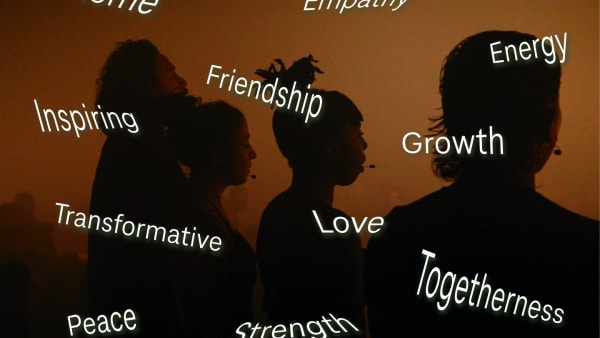

Year in Review: The Rave Anthems That Defined the Women’s Strike in Poland
The protests took place in retaliation of a near-total ban on abortion set to be imposed by the right-wing nationalist government. Eta Hox, HiTrash, Meg, v͏i͏r͏t͏u͏a͏l ͏g͏e͏i͏s͏h͏a, aetha, and Outta_8 are among the artists responsible for DJing the movement.
When Eric Prydz released “Call On Me” in 2004, he surely could not have anticipated it would resurface as a rallying cry for one of the biggest protest movements in Polish history. Early noughties nostalgia may have been all the rage across broad pop cultural trends, but in October 2020, house duo Lambert & Handle’s edit of the classic track became an anthem shouted by thousands of protesters across the country singing “Jebać PiS” (which translates to “fuck PiS”), perfectly beat-matched over the song’s original chorus. The protests took place in retaliation of a near-total ban on abortion set to be imposed by the right-wing nationalist government. Car drivers created a series of blockades in city centers and thousands of people marched to express their anger at the ruling of Poland’s constitutional tribunal.
Ever since Poland’s right-wing Law and Justice party (short: PiS, for Prawo i Sprawiedliwość) were elected to power in 2015, the Polish clubbing community has become increasingly politicized, banding together in protest against the governments’ stance against women’s rights and what they describe as the “ideology” of the LGBTQ+ community. Demonstrations against the government have long been organized within Poland’s clubbing scene. The annual date of Polish independence is often co-opted by members of the far-right group National-Radical Camp (ONR) as a day of celebration of nationalist politics. Two years ago, antifascist groups organized a massive counter-demonstration and parade as part of the 100th anniversary of women’s suffrage in Poland, which occurred two weeks after the country gained independence in 1918.
This element will show content from various video platforms.
If you load this Content, you accept cookies from external Media.
This fall, when the Polish government announced its constitutional court ruling to introduce the almost-total ban on abortion, activists in Warsaw and 150 more cities covered their streets with political graffiti in support of the women’s strike. DJs and music collectives teamed up immediately to discuss what they could do to support the strike, swiftly organizing techno blockades to keep morale high among demonstrators. In Krakow, Polish DJs Eta Hox, HiTrash, Meg, v͏i͏r͏t͏u͏a͏l ͏g͏e͏i͏s͏h͏a, aetha, and Outta_8 played records to crowds of up to 30,000 masked protesters in front of the National Museum.
“Music has always had great power for me and delivered more values than just a melody and rhythm,” says Aneta Jońska, who goes by aetha, of her performance. She caused mass euphoria on the streets of Krakow by closing out her set with the Italian protest song “Bella Ciao,” which was originally written in support of workers’ rights and later evolved into an anti-fascist anthem. To aetha, staying neutral was never an option. “I have always been politically and socially engaged. What is currently happening in our country is a total absurdity for me, I had to speak up.” For the first time in her life, she says, “I was able to vent my emotions and express my anger.”







Meanwhile in Warsaw, Poland’s favourite neo-gabba collective WIXAPOL hired their own truck with a soundsystem, blasting techno, gabber, and hardcore classics to the protesters roaming the city streets. The aggressive trance stabs and explicit lyrics of EURODANEK’s “JEBAX” kept hundreds of thousands on their feet for hours. Originally released last year as part of ORAMICS’ “Total Solidarity” compilation, an updated version of Avtomat’s hard ballroom-inspired track titled “Nieludzie / Ignorance Ha” was rereleased for this year’s demonstrations in Poland. The new edit, mastered by Air Max ’97, features the now-infamous quote of Poland’s Minister of Education Przemysław Czarnek calling the LGBTQ+ community an “ideology,” and labeling discussions around human rights as “nonsense.” Avtomat’s track became a powerful reminder of the defiance of Poland’s oppositional movement, seeing as the Warsaw-based producer was arrested back in August, at an anti-police brutality protest in solidarity with Margot Szutowicz, co-founder of the feminist and LGBTQ+ activist group Stop Bzdurom, who had been held in pre-trial detention.
This element will show content from various video platforms.
If you load this Content, you accept cookies from external Media.
Elsewhere in the capital, visual artist Szymon Weiss released “Respiracja,” a pacifist audio-visual manifesto in reaction to the country’s intensification of nationalist attitudes. INSTYTUT, one of Poland’s oldest and most reputable techno brands responsible for legendary raves in the brutalist building of Instytut Energetyki, Warsaw’s energy research center, and Instytut Festival, showed their solidarity with the demonstration in a black and white video depicting ravers marching in the streets, declaring that techno is the music of “revolution.” INSTYTUT also shared the new EP by Hatelove, aptly titled “***** ***,” which codifies the statement “Fuck PiS.” All of the record’s profits were distributed to the pro-choice organization Aborcyjny Dream Team.
By loading the content from Soundcloud, you agree to Soundcloud's privacy policy.
Learn more
INSTYTUT affiliate MELANIA . took part in the demonstrations in Berlin and released a track titled “Wypierdalać” which translates to “Fuck Off,” sampling the words spoken by activist Barbara Nowacka and the screams of people demonstrating in the city of Gdańsk.
The events that occurred in Poland this year are a reminder that club culture is about much more than hedonism and forgetting about your everyday life—it’s a powerful, positive force that can sustain protest movements and unify people in their quest to improve social conditions and resist oppressive structures.

Photos by Artur Wojtczak and Przemysław Matląg.
Published December 23, 2020. Words by Artur Wojtczak.












Follow @electronicbeats